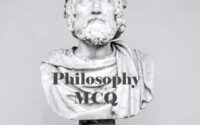Philosophy Mock Test Papers
On this page, Applicants can check the below links for downloading the Philosophy Mock Test Papers. The Philosophy Mock Test Papers will be helpful for the applicants in their preparation. Hence, the people can begin the practice by downloading Philosophy Mock Test Papers.

The Philosophy Mock Test Papers may not contain the originally asked questions. Free downloading links of the Philosophy Mock Test Papers are enclosed below.
Mock Test on Philosophy
1. In the context of foreign policy, according to Kautilya, the following principle should be followed by a king:
(A) King must always remain aggressive
(B) King can enter into war with any enemy
(C) King should not enter into war with more powerful enemy
(D) King must always think of treaty to avoid any war situation
2. What is the golden rule about foreign policy according to Kautilya?
(A) Enemy of enemy is one’s friend
(B) Enemy of friend is one’s enemy
(C) Friend of enemy is one’s enemy
(D) Friend of friend is one’s friend
3. Which one of the following statements is not true of patriarchy?
(A) Patriarchy is caused by the biological inequalities between women and men
(B) Male control over women’s sexuality and reproductive functions is a fundamental cause and result of patriarchy
(C) Patriarchy causes oppression as a result of alienating women from their bodies
(D) Patriarchy is essential condition for women to demand their rights as equal citizens
4. Who among the following political thinkers defends the Aristotelian ideal of intimate, reciprocating focal community bound by shared ends, where people simply assume and fulfill socially given roles?
(A) Alasdair Macintyre
(B) Charles Taylor
(C) John Rawls
(D) Isaiah Berlin
5. According to Marx the origin of alienation is commodity fetishism. Which of the following is not a part of Marx’s explanation of alienation?
(A) Inanimate things (commodities) have human powers (i.e. value)
(B) Inanimate things (commodities) are able to govern the activity of human beings
(C) Social relationships involved in production are not relationships among people, but only economic relationships
(D) Inanimate things (commodities) are incapable of governing the activity of human beings
6. Which one of the following is not true of normative claims that are entailed in the theoretical framework proposed by Amartya Sen’s capability approach?
(A) The freedom to achieve wellbeing is of primary moral importance
(B) Freedom to achieve well-being is to be understood in terms of people’s capabilities
(C) People’s capabilities mean their real opportunities to do and be what they have reason to value
(D) The freedom to sell one’s produce at a desired price in the free market
7. The process by which things of the world, not belonging to anyone, become appropriate objects, pertains to which of the following principles of justice according to Robert Nozick?
(A) A principle of justice in Acquisition
(B) A principle of justice in Transfer
(C) A principle of justice in rectification
(D) A principle of justice in decision making
8. One of the dominant reasons for people to enter into social contract according to Hobbes is:
(A) Self-preservation
(B) Inner sense of justice
(C) Universal love
(D) Love of wisdom
9. According to socialist feminism which of the following is the foremost reason for the subjugation of women?
(A) Their financial dependence upon men
(B) Their biological difference from men
(C) Lack of political representation
(D) Lack of education
10. Which of the political thinkers distinguishes between equality of opportunity and equality of respect on two elements in the idea of equality?
(A) John Rawls
(B) Karl Marx
(C) Bernard Williams
(D) Charles Taylor
11. The statement “Female subordination is rooted in a set of customary and legal constraints that blocks women’s entrance to and success in the so-called public world” belongs to which of the following feminist theories?
(A) Radical feminism
(B) Eco-feminism
(C) Liberal feminism
(D) Socialist feminism
12. In Plato’s Republic which one of the following is a reason why philosophers should rule a city?
(A) They hate poetry
(B) They are mindful of both body and spirit
(C) They are easily able to convince others
(D) They love what is rather than what becomes
13. A deductive argument is invalid it and only if ……………… .
(A) all its premises are true and the conclusion is false
(B) all its premises are false and conclusion is also false
(C) some of its premises are false and conclusion also false
(D) all its premises false and conclusion true
14. According to quality, propositions are divided into:
(A) Universal and Particular
(B) Simple and Compound
(C) Affirmative and Negative
(D) Necessary and Probable
15. Which one of the following is not a valid mood of first figure of a syllogism?
(A) Barbara
(B) Celarent
(C) Darii
(D) Boroco
16. The law that states—‘A is either B or not B’ is:
(A) Law of Excluded Middle
(B) Law of Contradiction
(C) Law of Identity
(D) Law of Nature
17. ……………. opposition is the relation between two particular propositions, which have the same subject and the same predicate but which differ in quality.
(A) Contrary
(B) Sub-contrary
(C) Contradictory
(D) Subalternation
18. Identify the fallacy committed in the following syllogism:
No men are perfect
All men are animals
No animals are perfect.
(A) Fallacy of Illicit Major
(B) Fallacy of Illicit Minor
(C) Fallacy of Negative Premises
(D) Fallacy of Undistributed Middle
19. Find out the incorrect option:
(A) If an Axiomatic system is constistent it can’t be complete
(B) If an Axiomatic system is consistent it does not contain ‘p’ and ‘~p’ as its axioms or theorems
(C) An axiomatic system is consistent iff not every wff is a theorem of that system
(D) An axiomatic system is consistent iff every wff is a theorem of that system
20. Who is propounder of the view that animals do have intrinsic value?
(A) Peter Singer
(B) Tom Regen
(C) Aldo Leopold
(D) Arne Naess
More Question Papers on Philosophy
| Question Papers | Question Bank |
| MCQ Objective | Practice Set |
| Selected Question | Mock Test |
| Typical Question | Old Questions |
| Test Papers | Sample Papers |
| Important Question | Model Question |
21. Community includes both biotic and abiotic factors. This assertion is made by:
(A) Land Ethics
(B) Deep Ecology
(C) Shallow Ecology
(D) Medical Ethics
22. According to Jodal Radinov:
(A) Life begins with birth
(B) Birth is morally insignificant phenomenon
(C) Life begins with conception
(D) Conception is morally insignificant phenomenon
23. A slippery slope argument about Abortion states:
(A) Abortion is justified but killing the child is not
(B) If abortion is justified, killing the child is also justified
(C) Both abortion and killing the child are justified
(D) There is no link between the justifiability of abortion and that of killing the child
24. Who is the author of Silent Spring?
(A) Rachel Carson
(B) Arne Naess
(C) Aldo Leopold
(D) Peter Singer
25. Which of the following isn’t principle of media ethics?
(A) Ensuring the authenticity of the news
(B) Unbiased attitude
(C) Maintaining privacy
(D) Propaganda
26. Justice is ………… concept.
(A) Legal
(B) Moral
(C) Psychological
(D) Scientific
27. Hiranyagarbha in Upanisada is known as:
(A) Visvakarama
(B) Prajapati
(C) Sahasraka
(D) Sahasra Sirsu
28. Which of the following are materialists (Jadavadi)?
(A) Naiyayikas
(B) Vaisesikas
(C) Carvakas
(D) Advaitins
29. Which among the following schools rejects anumana as a valid source of knowledge?
(A) Nyaya
(B) Jainism
(C) Buddhism
(D) Carvaka
30. Which of the following is Vritti (modification of citta ) as advocated by yogadarsana?
(A) Nidra (sleep)
(B) Antahkaran
(C) Manas (mind)
(D) Dravya (substance)
31. Which of the following is one of the arguments for existence of prakriti in Samkhyakarika?
(A) Bhedanam Parimanat
(B) Asadakaranat
(C) Bhoktrubhavat
(D) Adhisthana
32. Nibbana as understand by Buddhism indicates:
(A) Cessation of body
(B) Cessation of fruits
(C) Cessation of suffering
(D) Cessation of action
33. Which of the following is Bahirang Sadhana (External means) of Astanga Yoga?
(A) Asan
(B) Dharana
(C) Dhyan
(D) Samadhi
34. Which of the following statements is true?
(A) Both Prabhakara and Kumarila do not accept Anupalabdhi as a pramana
(B) Prabhakara does not accept Anupalabdhi but Kumarila does
(C) Prabhakara does not accept any of the Pramanas
(D) Prabhakara and Kumarila accept anupalabdhi as a pramana
35. According to Ramanuja, relationship between soul and body is …………
(A) Aprthaksiddhi
(B) Ayutasiddhi
(C) Prapatti
(D) Samavaya
36. The concepts of Niskama Karma and devotion are emphasized by:
(A) Samkaracarya
(B) Ramanujacarya
(C) Madhvacarya
(D) Vallabhacarya
37. The notion of daksina in Vedic tradition is associated with:
(A) Rta
(B) Rna
(C) Dharma
(D) Yajna
38. Which of the following is not maintained by Sankara?
(A) Atman and Brahman are identical
(B) Jiva and Brahman are identical
(C) Jagat is superimposition
(D) Atman is created by Brahman
39. Iqbal is a:
(A) Monotheist
(B) Polytheist
(C) Positivist
(D) Sceptic
40. “Uttisthata (Arise), Jagrata (Awake), Prapya Varannibodhata (stop not till the goal is reached)” is oft-quoted by:
(A) Sri Aurobindo
(B) Radhakrishnan
(C) Iqbal
(D) Swami Vivekananda
41. Which of the following is not written by Dr. Ambedkar?
(A) Who were the Shudras?
(B) Annihilation of Caste
(C) Buddha and his Dhamma
(D) Svaraj in Ideas
42. According to Aurobindo the goal of evolution is …………
(A) Integration
(B) Divine life
(C) Bliss
(D) Liberation
43. Philosophy of K.C. Bhattacharya is labelled as:
(A) Absolute Idealism
(B) Transcendental Idealism
(C) Logical Idealism
(D) Pure Idealism
44. ………… believed that freedom does not come through effort but it is the perception of truth that liberates.
(A) J. Krishnamurti
(B) K.C. Bhattacharya
(C) Rabindranath Tagore
(D) Mahatma Gandhi
45. Whether religious mind is important for J. Krishnamurti?
(A) Yes
(B) No
(C) Cant’s say
(D) Neither (A) nor (B)
46. Identify the work not written by Gandhi from the following:
(A) The Story of My Experiments with Truth
(B) Young India
(C) Discovery of India
(D) Hind Swaraj
47. Tagore proceeds from the observation of the “universe as a symphony’ to “music-maker” (God) which reminds us of:
(A) Ontological proof
(B) Cosmological proof
(C) Teleological proof
(D) Moral proof
48. “Man is the measure of all things” said:
(A) Protagoras
(B) Socrates
(C) Parmenides
(D) Gorgias
49. Parmenides rejects the reality of:
(A) Motion
(B) Multiplicity
(C) Change
(D) All of the above
50. Socrates was mainly concerned with the issues pertaining to:
(A) Ethics
(B) Psychology
(C) Epistemology
(D) Metaphysics

